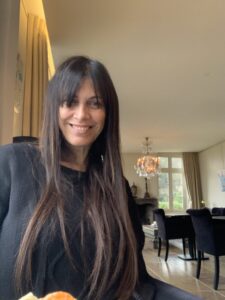The MLRC School Network Glocal Scholar series is part of our commitment to integrate local and global contexts and to explore a range of issues related to the education of multilingual learners. As defined in our recent publication, “Glocal Network Shifts: Exploring Language Policies and Practices in International Schools”, the term glocal reflects our goal to problematize the boundaries that often exist between conceptions of “global” and “local”, including the separation sometimes observed between international schools and their local context.
 Dr. Valeria Abusamra presented at the MLRC Research Symposium on February 21-22nd in Buenos Aires, Argentina at Asociacion Escuelas Lincoln. Dr. Valeria Abusamra holds a PhD in Linguistics and continues her 20-year journey of studying language from a psycholinguistic and neurolinguistic perspective. Dr. Abusamra is also a professor at the University of Buenos Aires, a researcher at CONICET, and works at the Eva Perón Hospital in San Martín, where she conducts her research.
Dr. Valeria Abusamra presented at the MLRC Research Symposium on February 21-22nd in Buenos Aires, Argentina at Asociacion Escuelas Lincoln. Dr. Valeria Abusamra holds a PhD in Linguistics and continues her 20-year journey of studying language from a psycholinguistic and neurolinguistic perspective. Dr. Abusamra is also a professor at the University of Buenos Aires, a researcher at CONICET, and works at the Eva Perón Hospital in San Martín, where she conducts her research.
Language is fascinating, both in its oral and written forms. Knowing that from a finite number of elements (words) we can produce an infinite number of messages makes it, without a doubt, worthy of study and discussion. Language permeates us; it defines us as a species. It involves us in a path that bifurcates. While spoken language unfolds without the need for teaching, without awareness of the logic behind it, and without apparent effort, written language reveals the traits of a skill that is cultural. One of the most prominent aspects of language, especially in educational and social contexts, is literacy. Valeria’s work focuses precisely on the study of language from a psycholinguistic, neuropsychological, and neurolinguistic perspective. From a psycholinguistic standpoint, Valeria Abusamra studies the processes underlying reading and writing, as well as the most important predictors of each skill. From a neuropsychological perspective, Valeria focuses on designing assessment and intervention resources and studying various disorders that affect language at each level of analysis. In this context, she has been researching for over twenty years the performance of patients with right hemisphere lesions, who exhibit pragmatic-level disorders.
A particularly relevant aspect of her academic journey is the dissemination of the research Valeria carried out. Opening the dialogue about language, “telling” it, is crucial and urgent as it allows us to understand it better and to grasp the nature of its difficulties. It cannot be ignored that poor management of linguistic resources is undeniably linked to levels of inequality. Closing this gap is returning to a large sector of the population the possibility of thinking, imagining, and deciding in the best possible way. The more we understand about language, reading, and writing, the more we understand our world, the better we can participate within it, and the more we can change it. As Charles Bazerman says, by writing, one gains their voice, establishes their presence, meaning, and value within systems, and can also transform those systems to make the world a better, more livable place.
The problem of reading and writing difficulties and the skills at the textual level of students in different stages of their educational journey has been documented in national and international research. Its relevance has been recognized by various global organizations working from different perspectives in developing strategies for improvement. In Latin America, and specifically in Argentina, there are alarming indicators concerning performance in tasks involving reading and writing. This concern is particularly significant when considering the high ecological value of these skills. Therefore, dialogue with agents from different educational systems becomes essential.
In this regard, the MLRC Research Symposium promotes this exchange between researchers and teachers, between science and education, two aspects that should unite and enhance each other. The symposium has been a space for exchange, reflection, and discussion on shared practical problems and the design of innovative strategies that could be applied in the classroom.
Valeria Abusamra
E-mail: vabusamra@gmail.com
Instagram: @valeabusamra
Linkedin: https://www.linkedin.com/in/valeria-abusamra-603a0639/


